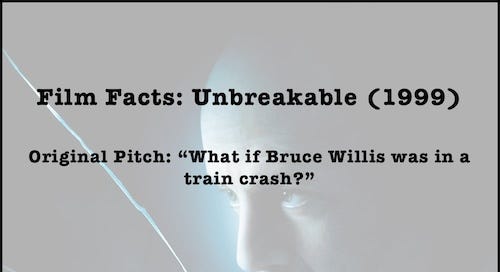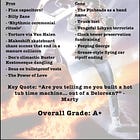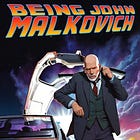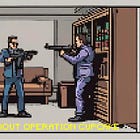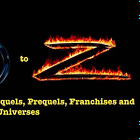U is for Unbreakable
In which I discuss the twisting of plots, top-right quadrant occupation, and the undercutting of Scorsese
Previously:
Surprise! Who said these were going to come out in alphabetical order?
Which brings us, of course, to twists. And, hence, M. Night Shyamalan (the M stands for ‘man, I did not see that coming’. And, general warning, I will be spoiling all kinds of Shyamalan movie twists in this piece. Back out now if you don’t want to know.)
In 1999, Shyamalan sprung The Sixth Sense on a dumbstruck moviegoing public. The ghost story about a young boy who sees dead people and the psychiatrist who tries to talk some (ie, approximately one-sixth of) sense into him was both a critical and commercial success.
Famously, 1999 is now considered one of the all-time great years of cinema, and The Sixth Sense was second across both the US and world box offices over that twelve-month period, pipped only by the pod-racing biopic phenomenon that was Star Wars: Episode I - The Phantom Menace. (Shyamalan’s infamous response to falling just short of the top spot? ‘Poodoo!’)
While Star Wars proved a Binks too far, however, The Sixth Sense beat out a multitude of other box office big-hitters, such as Austin Powers: The Spy Who Shagged Me, Toy Story 2, The Matrix, Big Daddy, The Mummy, American Pie, et al. (Beating all these other films should not be surprising, however. It is, after all, precisely what ‘second at the box office’ means.)
The Sixth Sense also held its own in terms of critical acclaim, garnering six Oscar nominations, including one for Best Picture alongside American Beauty, The Cider House Rules, The Insider and The Green Mile. While other films have risen in cinematic standing in the quarter-century since then (hello Fight Club, Magnolia, Being John Malkovich, The Iron Giant and friends), The Sixth Sense remains a standard-bearer of one of Hollywood’s greatest years (others not yet mentioned include Election, Galaxy Quest, Eyes Wide Shut, Girl, Interrupted, Notting Hill, The Blair Witch Project, South Park: Bigger, Longer & Uncut, Office Space, Cruel Intentions, Mystery Men, Bowfinger and, of course, my personal favourite, the magnificent Deep Blue Sea, a movie about scientists genetically engineering super-intelligent sharks in the hope that one of them might cure Alzheimer’s and/or defeat the Deep Blue computer at chess. People aren’t mucking about when they call it one of the best years in the history of cinema.)
Of all these great movies, however - the ones featuring genius sharks and the ones that shamefully didn’t - The Sixth Sense was the most lauded box office performer of the year. Or, if you prefer, it was the highest earning critical darling of the year. Either way, that’s solid top-right quadrant work from Shyamalan.
All of this meant there was a lot of interest in his next movie, Unbreakable, which came out the following year. Shyamalan didn’t make The Sixth Sense 2 (aka The Seventh Sense). Instead, he teamed up yet again with Bruce Willis to make, of all things, a superhero movie.
In the year 2000, this was a wild choice. This was before the MCU, which kicked off with 2008’s Iron Man. It also pre-dated Christopher Nolan’s Dark Knight trilogy, which Batman-began in 2005. Sam Raimi’s Spider-Man trilogy came later too, with its first instalment in 2002. Pixar’s The Incredibles? Nope, 2004. Zack Snyder’s Watchmen? 2009. The rest of Zack Snyder’s unholy DC mess? Who can remember the precise details, but also definitively later than Unbreakable.
So, yeah, when Shyamalan released Unbreakable, superhero films weren’t really a thing. Oh, sure, there’d been a couple of prior DC enormous’uns. Christopher Reeve had made us believe that a man could fly in Superman (1978), but that franchise had run out of steam by Superman IV: The Quest For Awful F/X (1987). Michael Keaton had then tag-teamed in, donning a batsuit for Tim Burton’s Batman (1989), but, similarly, that franchise met its Joel Schumacher by its fourth instalment (Batman & Nipples (1997)).
Over on the Marvel side, Wesley Snipes had made a Blade in 1998, which would later spawn a couple of sequels. Six months prior to the release of Unbreakable, we also saw the first in what will (spoiler) almost certainly be my X entry in this series with X-Men (2000). There’d also been the odd non-DC, non-Marvel successes such as The Mask (1994) and Teenage Mutant Ninja Turtles (1990), as well as occasional non-comic book-based superhero entries such as Darkman (1990). But for the most part, the superhero film at the turn of the century was well established as niche material, made primarily for children or idiots (or, in the case of Steel (1997), idiot children).
Unbreakable was something different. A superhero movie positioned squarely in the ‘yes, but what if superheroes existed in the real world?’ subgenre. The marketing suggested that Shyamalan had eschewed all the silliest tropes of superheroes, giving permission to non-idiot non-children to make their way to the movie theatre to check it out.
Once he had his audience in their seats, though, Shyamalan slowly sprung his nefarious trap. (Can one slowly spring a trap? Let’s say one can.) Yes, Unbreakable was ostensibly set in ‘our’ world (or near enough approximation to it). But gradually, inexorably, Shyamalan betrayed his love of superhero comics and their tropes, drip-feeding them into the story.
It began with Bruce Willis’s character, David Dunn, whose alliterative name maintained a tradition as old as Peter Parker, Bruce Banner, Reed Richards, Sue Storm, Pepper Potts, Stephen Strange, Scott Summers, Warren Worthington, Betsy Braddock, Moira MacTaggert, Wade Wilson, Matt Murdock, Miles Morales, Kamala Khan and Jessica Jones (to just cover off some of the Marvel heroes).
In short order, we also got an origin story - Dunn was the sole survivor of a train crash that killed everybody else on board. How did he survive? Because he was born hella tough, with Shyamalan totally leaning into the notion that Bruce Willis was the kind of man who died hard.
There was some further handwavey explanation for Dunn’s titular unbreakability from Willis’s Die Hard With A Vengeance co-star, Samuel L Jackson. Jackson played Elijah Price, a comic book nerd sufficiently devoted to the genre that he was not merely puny enough to have sand kicked in his face, but so physically weak that his bones broke at the slightest touch.
The Price rationale was that if there was somebody super-fragile at one end of the human scale, then basic normal distribution outlier symmetry-based logic suggested there must be somebody super-unfragile at the other end. And that person was Dunn.
Fine. Whatever. I’ve heard sillier origin stories. (Google ‘Bouncing Boy’ sometime, people.)
After giving us the origin, Shyamalan continued doling out the superhero tropes. Dunn gets a kid sidekick, a la Robin, when his son buys into the premise of the movie almost immediately. A secret identity? No problem. Dunn simply decides he doesn’t want to tell his wife about his powers (why? I dunno, because of the patriarchy?).
A training montage? Sure. Dunn lifts heavier and heavier weights as he realises he’s far stronger than he thought. (He also discovers that his security guard intuition that he’d previously used to detect which sports fans might be nogoodniks is actually some kind of telepathic superpower.)
A weakness? Yep. Water is apparently Dunn’s kryptonite (krypH₂Onite?). A costume and cape? Well, kinda, as Dunn dons a hooded rain poncho to mask his identity and/or keep him dry.
Tropes all sorted, Dunn eventually confronts one of the more villainous dudes he’s bumped into. (Like, literally bumped into. His telepathic power works by touching people and getting visions of crimes they’ve committed - an infobump, if you will.) This bad guy is the nefarious Maintenance Man, a sadistic janitor holding an innocent family hostage, and the battle with him gives us one final superhero trope - a villainous death trap. By which I mean, a death tarp, as Dunn gets all tangled up in a tarpaulin that covers a swimming pool and almost drowns.
That’s a good tally of superhero tropes by any measure. Proper superhero movie-making from Shyamalan.
Then, of course, there was the twist.
The Sixth Sense famously had a big twist. One that it pulled off superbly. The final scene revelation that Bruce Willis died so hard that he didn’t even know he was dead the entire movie forced audiences to completely reevaluate everything they’d seen over the previous couple of hours. The skill with which Shyamalan had misdirected everybody was one reason the movie was so critically acclaimed. Furthermore, the urge to immediately watch the movie again to see how he’d done it helped on the commercial front, too (people paying to see a movie a second time is widely considered to be twice as lucrative as people paying to see it only once).
Given the Sixth Sense’s success, it was perhaps unsurprising that Unbreakable had a twist ending too. This time, the twist was that the Samuel L Jackson character had been so obsessed with finding his opposite that he’d caused not just the train derailment that kicked the plot into action but a myriad of other mass-fatality accidents. If Dunn was the superhero, Elijah was to be the supervillain, dubbing himself Mr Glass.
The thing about plot twists, though, is that they depend on the element of surprise. They become much harder to pull off if the audience goes in expecting a twist.
The Sixth Sense got away with it, because it was Shyamalan’s first big hit (he’d done a couple of smaller movies prior) and nobody knew this was going to be his gimmick. Also, even when word spread that The Sixth Sense had a twist, most audience members seemed to mistake the well-advertised hook of the movie (‘I see dead people’) for the twist (‘I see dead people such as you, Bruce Willis, for you are dead and have been the entire movie’), allowing the surprise of the latter to unfurl successfully.
Unbreakable’s twist ending wasn’t as strong as The Sixth Sense’s, but it still had an element of surprise. After all, just because Shyamalan’s first big movie had contained a twist ending, that didn’t mean they all would.
After Unbreakable, though, Shyamalan had nowhere to hide. He therefore leant into his branding as the plot twist guy to mostly diminishing returns. People were onto him, which meant he had to work harder and harder to overcome the lack of surprise. This, in turn, led to twists that more often induced head scratches than head over heels delight.
By the time we got to Split in 2016, then, eight movies later, Shyamalan’s brand was well established. And all the marketing for Split seemed to suggest it was more of the usual. A thriller with some horror elements, with the hook for this one being that the bad guy who’d kidnapped three young girls had dissociative identity disorder, manifesting in 23 distinct personalities for actor James McAvoy to flaunt.
Once again, however, the hook wasn’t the twist. And the twist Shyamalan had concocted for Split was inspired.
Everything about superhero movies had changed in the sixteen years between Unbreakable and Split. All those superhero movies and franchises that Unbreakable had predated had now taken over the box office. The tropes that Unbreakable had so carefully laid out had been fully embraced by the modern superhero flick.
So successful had the cinematic takeover of superheroes been that they’d even established their own tropes independent of the comic books that had inspired them. Most notable of these was the post-credits scene, which the Marvel Cinematic Universe, in particular, had used as a teaser for future instalments.
Unbreakable had adopted the classic comic book superhero tropes. Now, Split adopted this new cinematic superhero trope.
For, at the end of the movie, after our Final Girl, Casey (played by future gambiter of queens, Anya Taylor-Joy) had escaped from the secret twenty-fourth identity of the villain, ‘The Beast’, we cut to a post-credits scene. (Technically, a post-main title, pre-credits scene, but let’s not quibble over the details.)
This post-credit scene showed customers in a diner watching a news report on the villain (now known as The Horde), ending with a single line about Mr Glass, spoken by none other than Bruce Willis as David Dunn.
This final image was Shyamalan’s best twist since The Sixth Sense, one that he, having funded the movie himself, carefully hid from test screeners to avoid spoilers. It was a meta-twist, in that it didn’t recontextualise any aspect of the movie itself, but rather the genre of the movie. Dunn’s appearance transformed the film from a horror thriller to a supervillain origin story and stealth sequel. Surprise!
Like all good twists, the Dunn appearance made us reexamine everything we’d just seen. In retrospect, Split had toyed with the darker tropes of superhero comics. Sometimes this was explicit supervillain aspects. For example, to defeat The Beast, one had to say his true name ‘Kevin Wendell Crumb’, a mechanism reminiscent of Superman imp villain Mr Mxyzptlk, who is defeated by making him say his name backwards.
Even darker, though, was Shyamalan twisting some of the beloved characteristics of the most famous superheroes. The Beast crawled along the walls, but unlike your friendly neighbourhood Spider-Man, The Beast’s wall-crawling was disturbing, freaky shit. Similarly, the transformation from human to monster, a la The Hulk, was accomplished with minimal motion capture CGI, yet thanks to McAvoy’s performance, somehow outcreeped even your angriest of Banners.
And, like Superman, The Beast proved to be impervious to bullets and was seen bending steel in his bare hands, feats he accomplished with a terrifying absence of Christopher Reeve’s winning smile.
The success of Split and its genre-redefining twist allowed Shyamalan to round out the trilogy with a final film, Glass. What would he come up with for the third instalment? Would Dunn form the Justice League of Philadelphia alongside Rocky Balboa, Benjamin Franklin and, I dunno, a tub of cheese?
Alas, no. Instead, much of the movie is spent with all three characters in a psychiatric institution where they are repeatedly told by their shrink, Dr Ellie Staple, that the whole idea that they might be superpowered is all in their respective heads.
It’s a flimsy premise that requires the overlooking of some pretty big plot holes. For example, we saw in Unbreakable that Dunn could lift enormous weights. A simple demonstration of his bench press capabilities might have removed much of the good doctor’s scepticism.
But, also, perhaps not. Because the good doctor is eventually revealed to be not so good after all. She is this universe’s Martin Scorsese, not having any of this superhero nonsense and working tirelessly to undermine them.
The analogy with critics such as Scorsese (who famously claimed that Marvel movies weren’t cinema, albeit almost a year after Glass came out) continues into the back half of the movie, as Dr Staple confronts those who love and/or believe in the superheroes (Dunn’s now-adult son, Mr Glass’s mother and The Beast’s, uh, surviving kidnapping victim Casey) and explains to them that ‘comic books are not valid history’.
Mr Glass, however, has a plan, busting all three out so Dunn and The Beast can have a big fight in public. This will let the normals know that superheroes are real, which, in turn, will inspire more superbeings to come forth. (The proposed location of that fight? A newly opened tallest building in Philadelphia (y’know, the kind a superhero might leap in a single bound), explicitly advertised as ‘a marvel’. Because it’s the last film in the trilogy and Shyamalan is bloody well going for it.)
Instead, Dr Staple and her fellow haters of superheroes triumph, limiting the fight to the hospital grounds and killing the trio before they can get anywhere near the tower, before erasing all video footage of their superpowered antics.
But in the twist of this movie, Shyamalan reveals you don’t kill superhero movies so easily. The last scene shows that Glass secretly arranged for the video footage of their superbattle to be streamed to the wider world. Normal humans know about superheroes now. And there’s no getting rid of them.
Look, Glass doesn’t quite hold together as well as Shyamalan might have hoped. There are some leaps in illogic that are difficult to ignore and some narrative shortcuts that don’t quite bear scrutiny. But it’s a brave attempt, and, in its own way, a sweet love letter to the superhero movie genre from a man who believed in them before it became trendy to do so.
And I, for one, did not see that coming.
— Return to The Master List
If you enjoyed this, you might also enjoy my weird combination memoir/history of superhero comic book series. Or you might not. Only one way to find out, though.

